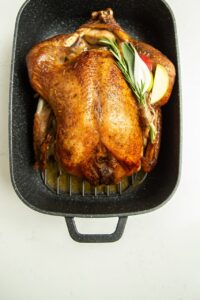
Oh you dirty bird!
One of the more contentious questions I get asked is whether raw turkeys or other birds need to be washed before you prep and cook them. My short answer:
Wash that bird.
The end-of-year festivities can be a stressful time for hosts and cooks alike. That means it’s easy to make some potentially dangerous, food-prep mistakes. The results can be deadly. In Canada and the US, there are 52 million cases of food poisoning each year and 3,200 reported deaths.
Washing with plain water is proven to be the most effective way to get rid of the bacteria on raw poultry. You literally rinse the bad stuff down your drain. The only issue with washing the bird is that, if you’re too forceful or messy with the water, you could be spraying and aerosolizing bacteria-laden water around your kitchen. That situation is easily managed though.
Here’s how to wash the holiday bird.
Put your raw bird in your clean sink. Run water gently over the bird. Use your hand to sluice the water over the bird and rinse off the bacteria. Rinse both the inside and outside of the bird. Gently pat the bird dry with paper towels and throw those out. The bird is now ready to be prepped for the oven.
Before you prep your bird though, clean up any spray created by washing the bird. Also clean anywhere you touched – surfaces and tools – with your dirty hands. First wash your hands. Then, wash all nearby surfaces – taps, the sink, counters, handles, utensils. You don’t need anything fancier than a damp cloth and soap and water, or any commercial spray cleaner or even a mix of bleach and water. Once you’re done, put the cleaning cloth in the laundry – don’t reuse it! For good measure, wash your hands again before handling the bird or any other food.
Soapy or chlorinated water create an environment that the bacteria cannot grow in. That’s why you can get rid of bacteria on your kitchen surfaces easily with nothing more than soapy water or bleach and water.
Here’s why it matters
The bacteria found on turkeys and other poultry include E.coli, Salmonella, and Listeria. All these pathogens can lead to stomach ache, diarrhea, vomiting, dehydration, permanent organ damage, and death.
Here’s why washing the bird works
Working with a veterinarian, I conducted a series of experiments on how best to rid poultry carcasses of pathogens. We discovered that highly chlorinated water or even just plain water significantly reduced the number of bacteria on and in the bird.
Turkeys, chickens and other poultry are cleaned by commercial food manufacturers to remove bacteria on the bird’s surface and internal cavity. However, it is impossible to get rid of every last germ. Remaining bacteria can reproduce during transport to the store, in the store, in your fridge, and during thawing. And oh how germs love a raw holiday bird (especially one that’s sitting in a warm room on the counter) to grow on!
Here’s a hot tip about stuffing the bird
I recommend that you cook any “stuffing” in a separate pan rather than literally stuffing the bird’s cavity. Stuffing the bird will insulate the bird cavity. That means heat will not distribute properly to the inside of the bird and bacteria could grow. Stuffing can also dry out the bird.
I fill the turkey cavity with moist ingredients such as an apple or whole onion, which subtly flavour and moisten the bird. You can use the onion and apple afterwards as part of the stock flavouring, if you make turkey stock.